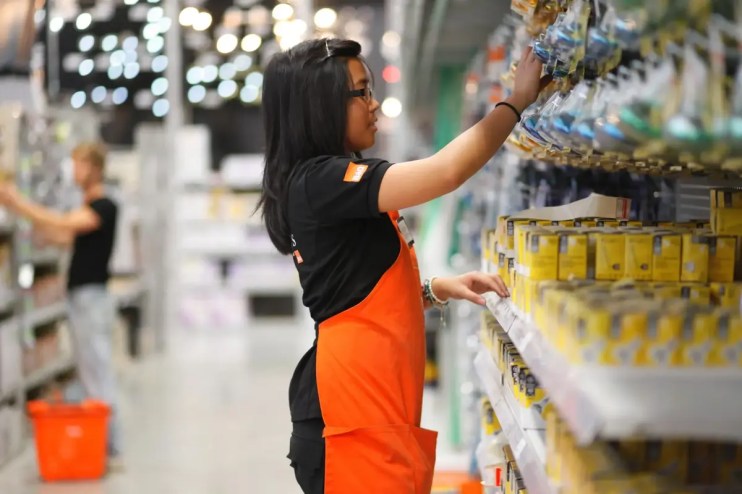Kingfisher shares soar: B&Q owner sales dip as customers shun ‘big-ticket’ items

B&Q owner Kingfisher has reported a “resilient” set of results after a series of profit warnings last year, but weaker sales in France continued to weigh on profit.
According to its half-year earnings for the six months ended 31 July 2024, sales fell by 1.8 per cent overall, to £6.75bn from £6.9bn, while gross profit fell by 0.6 per cent to £2.5bn.
The British multinational, which also owns Screwfix, said operating profit rose by two per cent to £374m, and earnings per share rose by 3.9 per cent to 12.8p.
Sales in France fell by 7.2 per cent year on year due to the “soft consumer backdrop”, the company said, while sales of big-ticket items fell by 6.8 per cent year on year.
E-commerce sales rose by 8.4 per cent, and sales at Screwfix and Tradepoint were positive, the company said.
Following its report, Kingfisher’s shares led gains on FTSE 100 this morning, rising by 7.20 per cent shortly before 9am.
Last year, Kingfisher issued two profit warnings for B&Q as it said a weak economy would dismantle its earnings for the full year but an improved economic backdrop seems to have aided the retailer, as sales at B&Q dipped only 0.2 per cent in the UK during the period.
Thierry Garnier, chief executive officer, said: “I am proud of the unwavering focus of our teams in executing against our strategic priorities, with two key highlights. First, our e-commerce sales penetration improved by 1.5 per cent to 18.3 per cent and B&Q’s e-commerce marketplace reached a 40 per cent share of its online sales. And second, in trade, we are extending the successes we have seen in the UK to other markets, with trade sales penetration growing strongly in France, Iberia and Poland.
“With positive early signs of a housing market recovery, notably in the UK, Kingfisher is strongly positioned for growth in 2025 and beyond.”
Kingfisher tightened its profit guidance and upgraded its free cash flow guidance for the year.
Thierry added the company remained “focused on continuing to manage costs and cash effectively, and driving further market share gains by delivering on our key strategic priorities”.
The firm rolled out £120m of cost-saving measures during the half.
Analysts have mixed response
Commenting on its results, Richard Hunter, head of markets at interactive investor, said “Kingfisher has seen some home improvement of its own, with the UK and Ireland continuing to prop up the wider business against a generally tough European backdrop.”
He said sales overall “slightly missed expectations” but “more positively, statutory pre-tax profit rose by 2.3 per cent to £324″.”
He added that “within the UK and Ireland Screwfix, long since Kingfisher’s jewel in the crown, continues to hold its own and indeed the format is now steadily being extended abroad.”
There is potentially more to come from the group’s largest unit in that there could be a boost resulting from an improvement in housing demand in the UK over the next few months, the beginnings of which are beginning to show.”
Julie Palmer, partner at Begbies Traynor, said: “Kingfisher’s half-year results show that despite recent share price and market share gains, the FTSE100 company has not been able to avoid the challenges that continue to dampen performances in the retail sector.
“Unfortunately for Kingfisher, it’s a similar story to the one told by DIY rival Wickes last week, with consumers still shying away from buying big-ticket items, which were down -6.8% in the first half.
“Looking ahead, Kingfisher will be holding its breath for Labour’s anticipated housebuilding commitment to come through – that should eventually increase demand for home repairs. However, uncertainty around the upcoming budget are likely to keep consumers from spending on discretionary items at least for the time being.
“However, the DIY giant’s ability to adapt to the modern marketplace is a real strength that should serve it well moving forward. Kingfisher’s robust e-commerce platform, burgeoning partnership with Deliveroo, and growing range of sustainable products are all effective strategic moves that align well with evolving consumer trends and preferences.”
